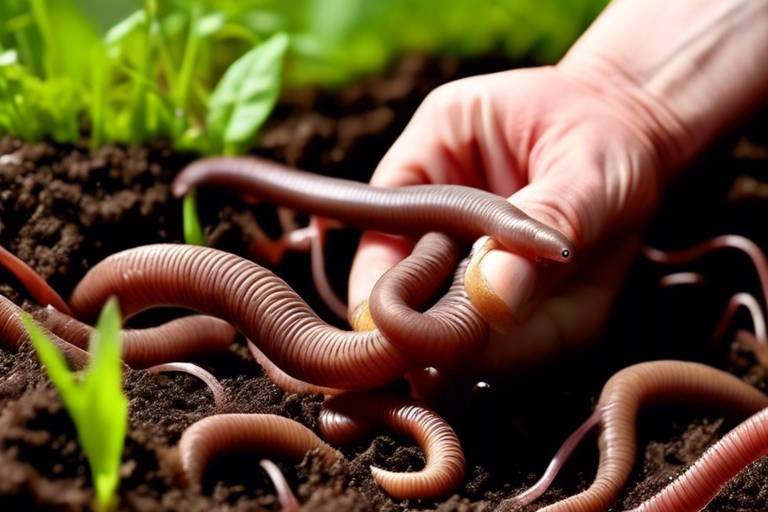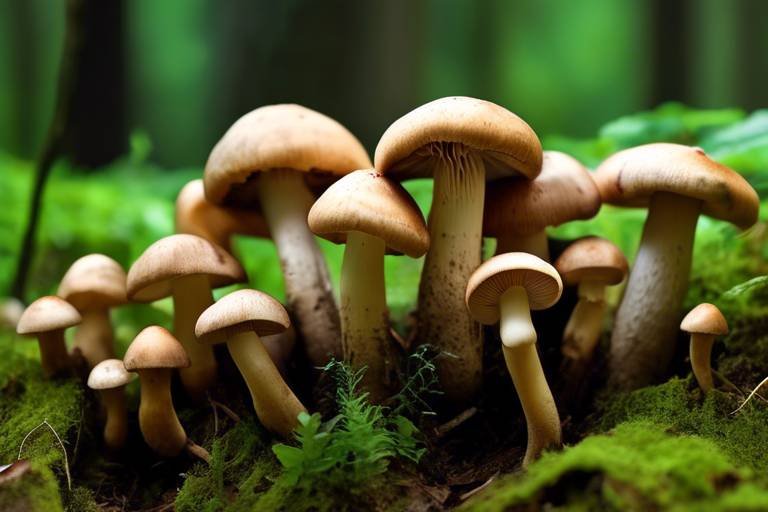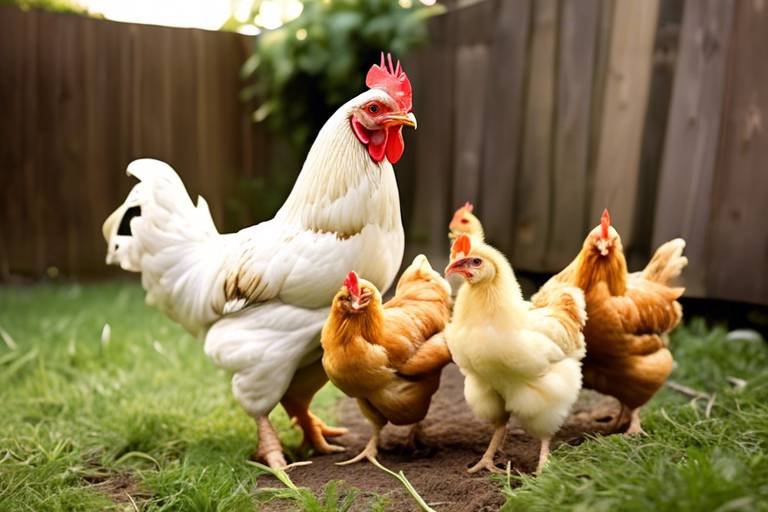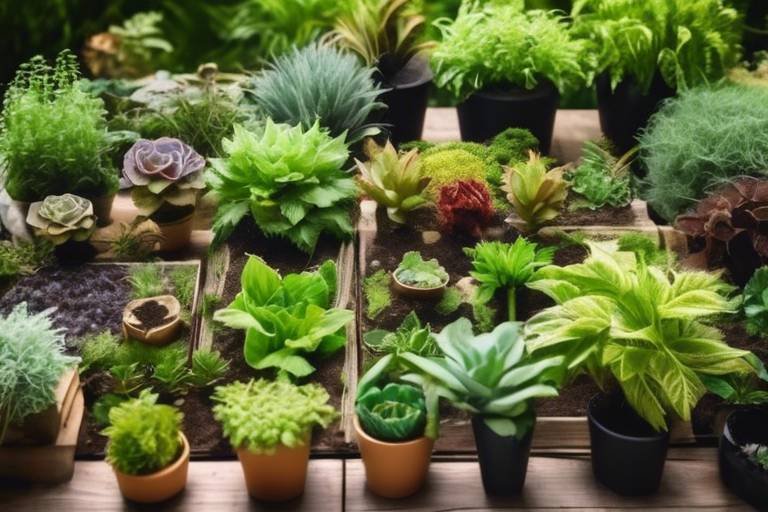Why are Earthworms Important for Eco-Friendly Gardening?
Have you ever wondered why gardeners rave about earthworms? These little creatures may not look like much, but they play a crucial role in creating a thriving, eco-friendly garden. Think of earthworms as nature's little gardeners; they work tirelessly beneath the surface, transforming your soil into a nutrient-rich haven for plants. By improving soil health, enhancing nutrient cycling, and promoting biodiversity, earthworms are essential allies in sustainable gardening practices. So, let’s dig deeper into why these slimy friends are so important!
Earthworms contribute significantly to soil structure and fertility. When they burrow through the earth, they create channels that allow air and water to penetrate the soil more easily. This aeration is vital for healthy root growth. Moreover, earthworms consume organic matter like dead leaves and decaying plants, breaking them down into smaller particles. This process not only enhances nutrient availability but also promotes microbial activity, which is essential for healthy plant growth. In a nutshell, earthworms are like the unsung heroes of the soil!
These creatures play a critical role in breaking down organic matter, facilitating the recycling of nutrients in the soil. When earthworms digest organic material, they produce castings rich in nutrients. This nutrient-rich fertilizer is then available for plants to absorb, supporting their health and productivity. Imagine earthworm castings as a superfood for your garden—packed with the essential nutrients that plants crave!
Earthworms are nature's recyclers. They aid in the decomposition of organic matter, transforming it into nutrient-rich castings that improve soil quality. This process not only enriches the soil but also helps maintain a balanced ecosystem. The more earthworms you have, the better your garden will thrive!
By breaking down organic material, earthworms help regulate soil pH levels. This regulation creates a more favorable environment for plants to thrive. A balanced pH is crucial because it affects nutrient availability; if the soil is too acidic or alkaline, plants may struggle to absorb what they need. Earthworms essentially act as nature's pH balancers!
The presence of earthworms boosts microbial communities in the soil. These microbes are essential for nutrient breakdown and availability to plants. Without earthworms, the microbial life in the soil would be less vibrant, leading to a less productive garden. Think of earthworms as the cheerleaders of the soil—encouraging microbial life to flourish!
Earthworms create burrows that enhance soil aeration and drainage. This is important because it allows roots to access oxygen and water more effectively. Well-aerated soil is less prone to compaction, which can suffocate roots and hinder growth. So, when you see earthworms in your garden, you can be sure they are working hard to keep the soil healthy!
The interaction between earthworms and plants is symbiotic. Earthworms improve soil conditions that directly benefit plant health and growth. When the soil is rich in nutrients and well-aerated, plants can establish strong root systems and grow more vigorously. It's like giving your plants a boost of energy!
The burrowing action of earthworms loosens the soil, enabling roots to penetrate more deeply and access nutrients and water more efficiently. This deep root development is crucial for plants, especially during dry spells when they need to reach deeper soil layers for hydration.
Healthy soil enriched by earthworm activity helps plants resist diseases and pests. When plants are stronger and more resilient, they can better withstand environmental stressors. This means fewer chemicals and pesticides are needed, making your garden more eco-friendly.
Earthworms contribute to a diverse ecosystem, supporting various organisms that coexist in healthy gardens. This biodiversity promotes balance and resilience against environmental changes. A garden filled with life is a garden that thrives!
The presence of earthworms encourages beneficial insects, creating a balanced ecosystem that aids in pest control and pollination. These insects play a vital role in maintaining the health of your garden, ensuring that plants can grow and reproduce effectively.
Earthworms help create a thriving habitat for various organisms, enhancing biodiversity and ecological stability within the garden environment. By supporting a range of species, earthworms contribute to a more resilient ecosystem that can better withstand challenges like climate change and pest invasions.
- How do I attract earthworms to my garden? - You can attract earthworms by adding organic matter like compost or mulch to your soil.
- Are earthworms harmful to my plants? - No, earthworms are beneficial and help improve soil health and plant growth.
- Can I have too many earthworms in my garden? - Generally, more earthworms mean better soil health. However, extremely high populations can lead to competition for food.

The Role of Earthworms in Soil Health
This article explores the vital role of earthworms in sustainable gardening practices, highlighting their benefits for soil health, plant growth, and overall ecosystem balance.
Earthworms are often referred to as nature's plow, and for good reason! These remarkable creatures contribute significantly to soil structure and fertility, enhancing nutrient availability and promoting microbial activity essential for healthy plant growth. Imagine your garden as a bustling city, with earthworms acting as the construction workers that build the infrastructure. They aerate the soil, making it more porous and allowing air and water to penetrate, which is crucial for root development. Without these little heroes, our gardens would struggle to thrive.
One of the primary ways earthworms improve soil health is through their unique digestive process. As they consume organic matter, such as decaying leaves and plant material, they break it down into smaller, more manageable pieces. This process not only speeds up decomposition but also transforms organic matter into nutrient-rich castings, often referred to as "black gold" by gardeners. These castings are packed with essential nutrients like nitrogen, phosphorus, and potassium, which are vital for plant health. In fact, the nutrient content of earthworm castings can be significantly higher than that of the surrounding soil. A study has shown that earthworm castings can contain up to **five times** more nitrogen than regular soil!
Moreover, earthworms play a crucial role in regulating soil pH levels. By breaking down organic material, they help create a more balanced environment for plants to thrive. This is particularly important for gardeners who wish to grow a diverse array of plants, as different species have varying pH preferences. Earthworms help maintain a neutral pH, which is generally favorable for most garden plants.
Another fascinating aspect of earthworm activity is their contribution to microbial communities in the soil. The presence of earthworms boosts microbial activity, which is essential for breaking down organic matter and making nutrients available to plants. These microorganisms work in tandem with earthworms to create a vibrant ecosystem that supports plant life. In fact, studies have shown that soils with a healthy earthworm population have a higher diversity of beneficial microorganisms, which can lead to improved plant health and resilience.
In summary, earthworms are indispensable allies in maintaining soil health. Their contributions to soil structure, nutrient cycling, pH regulation, and microbial activity make them vital for any eco-friendly gardening endeavor. So, next time you see an earthworm wriggling through your garden, remember that it’s not just a simple creature; it’s a powerhouse of soil health!
- How do I encourage earthworms in my garden? To attract earthworms, add organic matter like compost, mulch, and leaf litter to your garden. Avoid chemical fertilizers and pesticides, which can harm them.
- Are all earthworms beneficial for gardening? Yes, most earthworms are beneficial, but some species may not thrive in all environments. The common earthworm, Lumbricus terrestris, is particularly known for its positive impact on soil health.
- Can I buy earthworms for my garden? Absolutely! You can purchase earthworms from garden centers or online. Just ensure they are suitable for your local climate and soil conditions.

Earthworms and Nutrient Cycling
Earthworms play a crucial role in nutrient cycling, acting as nature's recyclers. These fascinating creatures break down organic matter, such as fallen leaves, dead plants, and even kitchen scraps, effectively transforming them into valuable nutrients that enrich the soil. But how exactly do they do this? Well, it all starts with their incredible digestive system. As earthworms consume organic material, they break it down through a process called decomposition, turning it into nutrient-rich castings—often referred to as worm castings or vermicompost.
These castings are a powerhouse of nutrients, containing essential elements like nitrogen, phosphorus, and potassium, which are vital for plant growth. In fact, studies have shown that worm castings can increase plant growth by improving nutrient availability. This means that when you have earthworms in your garden, you’re not just adding to the soil; you’re enhancing its fertility and capability to support robust plant life.
Moreover, the process of nutrient cycling facilitated by earthworms is not just beneficial for the soil; it also helps maintain a healthy ecosystem. When earthworms break down organic matter, they release nutrients back into the soil, making them available for plants. This cycle of consumption and decomposition leads to a continuous supply of nutrients, which is essential for sustainable gardening practices.
To illustrate the impact of earthworms on nutrient cycling, consider the following table:
| Nutrient | Source | Benefit to Plants |
|---|---|---|
| Nitrogen | Worm castings | Promotes leaf growth and overall plant vigor |
| Phosphorus | Decomposed organic matter | Supports root development and flowering |
| Potassium | Worm castings | Enhances disease resistance and fruit quality |
In addition to their direct contribution to nutrient availability, earthworms also enhance the microbial activity in the soil. Their castings serve as a habitat for beneficial microbes, which further assist in breaking down organic matter and releasing nutrients. This synergy between earthworms and microbes creates a thriving environment where nutrients are constantly cycled, ensuring that plants have access to what they need to grow strong and healthy.
Furthermore, the presence of earthworms in the soil helps to regulate its pH levels. As they break down organic material, they contribute to a more balanced soil pH, which is crucial for nutrient absorption by plants. A well-balanced pH allows plants to effectively take up nutrients, leading to improved growth and resilience against environmental stressors.
In summary, earthworms are not just simple soil dwellers; they are essential players in the nutrient cycling process. By breaking down organic matter, enhancing microbial activity, and regulating soil pH, they contribute significantly to creating a fertile and thriving garden ecosystem. So, if you’re looking to boost your garden’s health, consider nurturing the earthworm population in your soil. After all, a garden rich in earthworms is a garden rich in life!
- How do I attract earthworms to my garden? You can attract earthworms by adding organic matter like compost, mulch, and leaf litter to your garden. Avoid using chemical fertilizers, as they can harm earthworm populations.
- Are all earthworms beneficial for gardens? Yes, most earthworm species are beneficial for gardens. However, some non-native species can disrupt local ecosystems, so it's best to encourage native earthworm populations.
- How can I tell if my garden has enough earthworms? A healthy population of earthworms can often be identified by the presence of worm castings in the soil. If you notice a lot of castings, it’s a good sign that your garden is thriving!

Decomposition Process
When we think about the wonders of nature, earthworms often don't get the credit they deserve. These little wrigglers are not just a nuisance in your garden; they are, in fact, the unsung heroes of the . So, how do they work their magic? Well, it all starts with their incredible ability to consume organic matter. Earthworms feed on decaying leaves, dead plants, and even kitchen scraps, breaking them down into smaller, more manageable pieces. This not only speeds up the decomposition process but also transforms waste into nutrient-rich materials that are vital for soil health.
As earthworms digest this organic matter, they produce what are known as castings. These castings are essentially worm poop, but don't let the terminology fool you! They are packed with essential nutrients like nitrogen, phosphorus, and potassium, which are crucial for plant growth. In fact, worm castings are often referred to as "black gold" by gardeners because of their remarkable ability to enhance soil fertility. The nutrients in these castings are readily available to plants, making it easier for them to absorb what they need to thrive.
Moreover, the process of decomposition facilitated by earthworms also helps in the recycling of nutrients within the soil. As they break down organic matter, they release nutrients that were previously locked away, making them accessible to plants. This is a vital aspect of a healthy ecosystem, as it ensures that nutrients are continuously cycled through the soil. Without earthworms, this process would be significantly slower, leading to nutrient depletion and poor soil health.
To illustrate the benefits of earthworm castings, consider the following table:
| Nutrient | Benefit |
|---|---|
| Nitrogen | Essential for leaf growth and overall plant vigor. |
| Phosphorus | Supports root development and flowering. |
| Potassium | Enhances disease resistance and overall plant health. |
In addition to enriching the soil, earthworms also play a crucial role in maintaining soil structure. Their burrowing action creates spaces in the soil, allowing air and water to penetrate more easily. This improved aeration and drainage not only benefit the worms but also create a more favorable environment for plant roots to grow. Think of earthworms as nature's little construction workers, tirelessly working to build a robust foundation for your garden.
In summary, the decomposition process driven by earthworms is a cornerstone of sustainable gardening. By breaking down organic matter and producing nutrient-rich castings, they enhance soil fertility, promote nutrient cycling, and improve soil structure. So, the next time you see an earthworm in your garden, remember that it's not just a squirmy creature; it's a vital player in the intricate web of life that supports your plants and the ecosystem as a whole.
- What do earthworms eat? Earthworms primarily consume decaying organic matter, including leaves, grass clippings, and food scraps.
- How do earthworms benefit my garden? They improve soil fertility, enhance nutrient cycling, and promote better soil structure, all of which contribute to healthier plants.
- Can I use earthworm castings directly on my plants? Yes, worm castings can be used as a natural fertilizer and are safe for all types of plants.
- How can I attract more earthworms to my garden? You can attract earthworms by adding organic matter like compost, mulching, and maintaining moist soil conditions.

Effects on Soil pH
When it comes to gardening, soil pH is a crucial factor that can make or break your plants' health. Earthworms, those unsung heroes of the soil, play a significant role in regulating this essential aspect. As they munch through organic matter, they produce castings that are not only nutrient-rich but also have a remarkable influence on soil acidity and alkalinity. This process is akin to nature's own balancing act, where earthworms act as the tightrope walkers, ensuring that the soil remains in the sweet spot for plant growth.
The organic matter that earthworms break down includes leaves, grass clippings, and even food scraps. As they digest these materials, they help to release essential minerals and nutrients into the soil. This breakdown process can lead to a gradual adjustment in soil pH levels. For instance, the decomposition of acidic materials can help to neutralize overly alkaline soils, creating a more balanced environment for plants.
Moreover, the castings produced by earthworms are typically more alkaline than the surrounding soil. This means that their presence can help to raise the pH of acidic soils, making them more suitable for a wider variety of plants. Just imagine your garden as a delicate ecosystem where every element plays a part; earthworms ensure that the soil is not too acidic or too alkaline, but just right for your plants to thrive.
In addition to their direct effects on soil pH, earthworms also enhance the overall microbial activity in the soil. This increased microbial presence can further influence soil chemistry, promoting a healthier balance of nutrients and pH levels. The relationship between earthworms, soil pH, and plant health is a beautiful example of nature's interconnectedness. So, when you think about it, having a thriving population of earthworms in your garden is like having a team of expert gardeners working tirelessly to maintain the perfect conditions for your plants.
In summary, the effects of earthworms on soil pH are profound and multifaceted. They help to:
- Neutralize overly acidic or alkaline soils
- Enhance nutrient availability through their castings
- Boost microbial activity, which further stabilizes soil chemistry
By fostering a healthy population of earthworms, you can create an environment where your plants can flourish and thrive, leading to a lush and vibrant garden.
1. How do earthworms improve soil pH?
Earthworms improve soil pH by breaking down organic matter, which can neutralize acidity and produce alkaline castings that raise the pH of acidic soils.
2. What is the ideal soil pH for most garden plants?
The ideal soil pH for most garden plants typically ranges between 6.0 and 7.0, where nutrients are most available for plant uptake.
3. Can I add earthworms directly to my garden?
Yes! Adding earthworms to your garden can enhance soil health, but it's essential to ensure they are native species to your area to maintain ecological balance.
4. How can I encourage earthworm populations in my garden?
You can encourage earthworm populations by adding organic matter like compost, avoiding chemical fertilizers, and maintaining moisture in the soil.
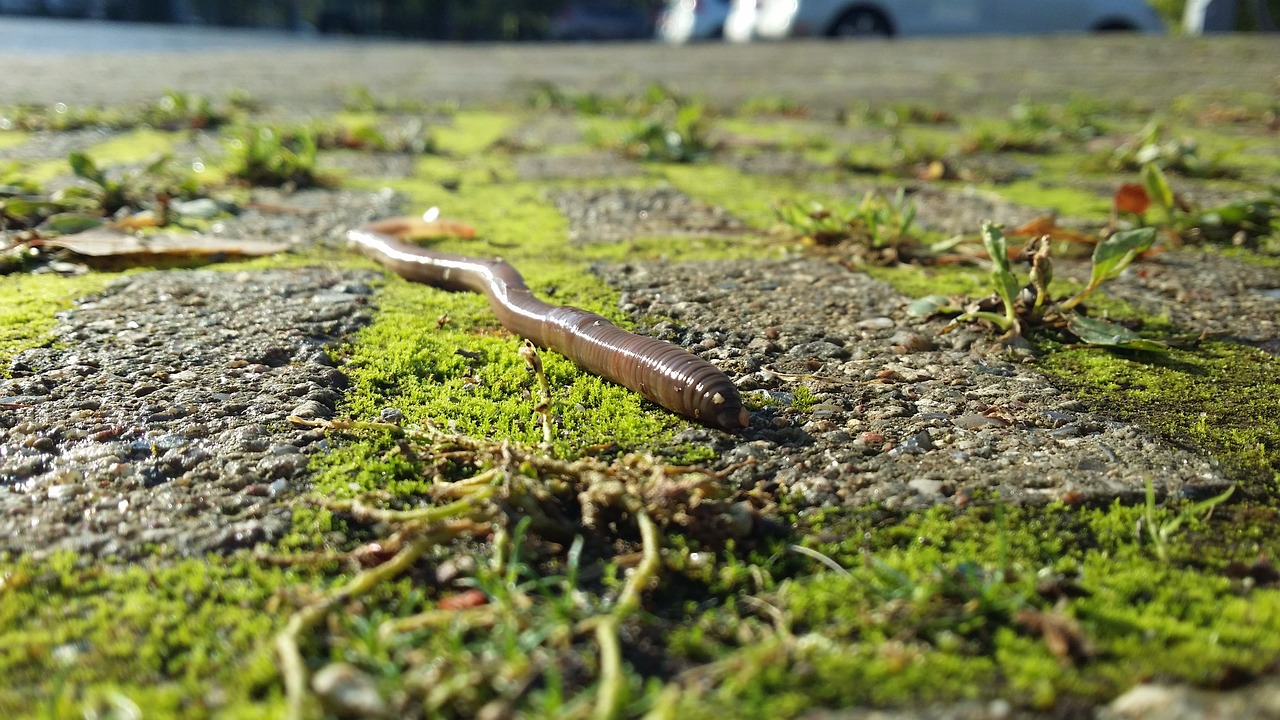
Enhancing Microbial Activity
Earthworms are not just wriggly creatures that we often overlook; they are nature's little engineers, playing a pivotal role in enhancing microbial activity in the soil. When earthworms burrow through the earth, they create intricate tunnels that allow air and water to penetrate deeper into the soil. This process is essential because it not only aerates the soil but also creates a hospitable environment for a myriad of microorganisms. These microorganisms, including bacteria and fungi, are crucial players in the decomposition of organic matter, nutrient cycling, and overall soil health.
The relationship between earthworms and microbes is truly symbiotic. As earthworms consume organic matter, they break it down into smaller particles, making it easier for microbes to access and process. This breakdown is vital for nutrient availability, as it transforms complex organic materials into simpler compounds that plants can readily absorb. In fact, studies have shown that soils rich in earthworm populations often exhibit higher microbial biomass and activity, which translates to improved soil fertility and plant health.
Moreover, earthworm castings—essentially their manure—are a powerhouse of nutrients. These castings are teeming with beneficial microorganisms that further enhance soil quality. The presence of these microbes in the castings not only enriches the soil but also helps suppress harmful pathogens, providing a natural defense mechanism for plants. It’s like having a built-in security system that protects your garden from diseases and pests.
To illustrate the impact of earthworms on microbial activity, consider the following table that outlines the benefits of earthworm activity on soil health:
| Benefit | Description |
|---|---|
| Aeration | Earthworm burrows allow air and water to reach deeper soil layers, promoting microbial growth. |
| Nutrient Cycling | Earthworms break down organic matter, making nutrients more accessible to plants and microbes. |
| Microbial Diversity | Enhanced microbial activity leads to a more diverse soil ecosystem, improving overall soil health. |
| Pathogen Suppression | Beneficial microbes in earthworm castings help suppress harmful pathogens, protecting plant health. |
In conclusion, the role of earthworms in enhancing microbial activity cannot be overstated. By fostering a thriving community of microorganisms, they contribute significantly to the overall health of the garden ecosystem. For anyone interested in eco-friendly gardening practices, encouraging earthworm populations should be a top priority. After all, a garden rich in earthworms is not just a garden; it's a vibrant, living ecosystem that supports a multitude of life forms, all working together in harmony.
- How can I attract more earthworms to my garden?
To attract more earthworms, you can add organic matter such as compost, mulch, and leaf litter to your garden. Avoid using chemical fertilizers and pesticides, as they can harm earthworm populations. - Are earthworms beneficial for all types of soil?
Yes, earthworms are beneficial for most types of soil. They improve soil structure, aeration, and nutrient availability, making them valuable in sandy, clay, and loamy soils alike. - How do I know if I have earthworms in my garden?
You can check for earthworms by digging into the soil and looking for them. Additionally, if your soil is crumbly and has a rich, earthy smell, it’s a good sign that earthworms are present.

Soil Aeration and Drainage
When you think about the health of your garden, might not be the first things that come to mind. However, these two factors are absolutely crucial for creating a thriving ecosystem. Earthworms, those wriggly wonders of nature, play a significant role in enhancing both aeration and drainage within the soil. As they burrow through the earth, they create a network of tunnels that allow air to flow freely, much like how a well-placed straw allows for the smooth sipping of your favorite drink. This aeration is vital because it enables roots to breathe and access essential nutrients.
Moreover, earthworm burrows facilitate better drainage. Imagine a sponge soaking up water; if it's too compact, it won't absorb much. Similarly, compacted soil can lead to water pooling, which can suffocate plant roots and promote rot. However, when earthworms create their tunnels, they act like tiny drainage pipes, allowing excess water to escape while retaining just the right amount for your plants to thrive. This balance is essential, especially in regions prone to heavy rainfall, where poor drainage can wreak havoc on your garden.
But the benefits don’t stop there! The improved aeration and drainage also promote a healthier microbial environment. With more air circulating in the soil, beneficial microbes can flourish. These microbes are like the unsung heroes of your garden, breaking down organic matter and releasing nutrients that plants can use. The presence of earthworms, therefore, not only optimizes soil conditions but also enhances the overall health and productivity of your garden.
In summary, earthworms are nature's little engineers, tirelessly working underground to ensure that our gardens are well-aerated and properly drained. Their burrowing activities create a robust soil structure that supports plant health, making them indispensable allies for any eco-friendly gardener. So, the next time you see an earthworm, remember that it’s not just a slimy creature; it’s a vital component of your garden’s success!
- How do earthworms improve soil aeration? Earthworms create tunnels as they burrow, which allows air to circulate through the soil, providing oxygen to plant roots.
- What is the role of earthworms in drainage? Their burrows help excess water drain away, preventing waterlogging and promoting healthier root systems.
- Can I add earthworms to my garden? Yes, introducing earthworms can enhance soil health, but ensure they are suitable for your local environment.
- How do I know if my soil needs aeration? Signs include poor drainage, compacted soil, and stunted plant growth.
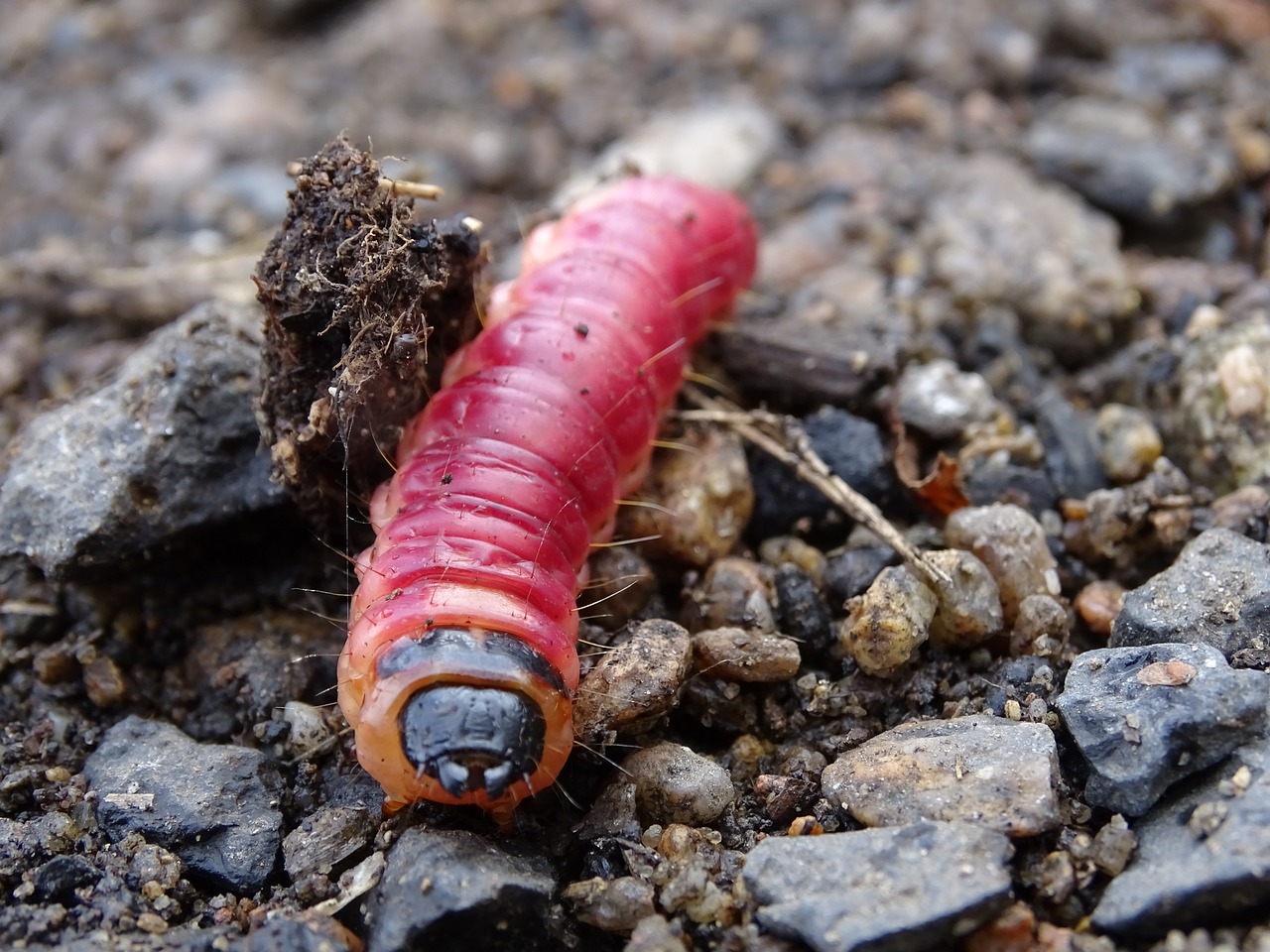
Earthworms and Plant Growth
When we talk about gardening, we often think of sunlight, water, and the right seeds. However, there’s a hidden hero in the soil that plays an equally crucial role: earthworms. These wriggly wonders are not just a nuisance; they are a gardener’s best friend! The interaction between earthworms and plants is nothing short of a beautiful symbiosis, where both parties benefit significantly. So, how exactly do these little creatures contribute to plant growth? Let’s dig deeper!
First off, the burrowing action of earthworms is like nature’s very own tilling machine. As they tunnel through the soil, they loosen it up, making it easier for plant roots to penetrate deeper. This means that plants can access more nutrients and water, which are essential for their growth. Think of it this way: if soil is compacted, it’s like trying to run a marathon in a pair of tight shoes. But with earthworms doing their thing, the soil becomes more like a comfy pair of sneakers, allowing roots to stretch and thrive.
Moreover, earthworms are natural nutrient factories. When they consume organic matter, they break it down and excrete it as castings, which are rich in nutrients like nitrogen, phosphorus, and potassium—key ingredients for healthy plant growth. These castings are often referred to as “black gold” because they improve soil fertility and structure. In fact, studies have shown that plants grown in soil enriched with earthworm castings often exhibit better growth rates and higher yields compared to those grown in non-enriched soil.
Another fascinating aspect of earthworms is their ability to boost plant resilience. Healthy soil, enriched by the activity of earthworms, creates a robust environment that helps plants fend off diseases and pests. It’s like having a natural defense system in place! When plants are well-nourished and growing in a thriving ecosystem, they are less likely to succumb to the various threats that can hinder their growth. This resilience is particularly important in today’s world, where gardens face numerous challenges from climate change and invasive species.
In summary, the relationship between earthworms and plant growth is a perfect example of nature’s interconnectedness. These creatures not only improve soil conditions but also enhance the overall health of plants. As a gardener, fostering a habitat for earthworms can lead to a thriving garden filled with vibrant plants. So, when you’re out in the garden, remember to appreciate the tiny, hardworking earthworms beneath your feet—they’re doing wonders for your plants!
- How do earthworms improve soil quality?
Earthworms enhance soil quality by aerating the soil, breaking down organic matter, and producing nutrient-rich castings that enrich the soil. - Can I add earthworms to my garden?
Yes! You can introduce earthworms to your garden, especially if you have a compost bin. They will naturally find their way into the soil and improve its health. - What types of plants benefit from earthworm activity?
Most plants benefit from earthworm activity, especially vegetables, flowers, and fruit-bearing plants that thrive in nutrient-rich soil.

Improving Root Development
When it comes to gardening, one of the most crucial aspects is ensuring that plants have healthy, robust roots. This is where our slimy friends, the earthworms, come into play. Their burrowing activities create a network of tunnels in the soil, which not only makes it easier for roots to grow but also enhances their ability to absorb water and nutrients. Imagine the soil as a sponge; when earthworms tunnel through it, they create channels that allow the sponge to soak up more water. This means that plants can access moisture and nutrients more efficiently, leading to stronger growth.
Moreover, the burrowing action of earthworms helps to break up compacted soil, which is often a major barrier to root development. Compacted soil can be like a brick wall for roots, preventing them from spreading out and accessing essential resources. With earthworms working their magic, the soil becomes more friable, allowing roots to penetrate deeper and spread wider. This is crucial for plants, especially during dry spells when they need to reach deeper water sources.
In addition to improving soil structure, earthworms also contribute to the nutrient profile of the soil. As they consume organic matter, they excrete nutrient-rich castings that are packed with essential elements like nitrogen, phosphorus, and potassium. These nutrients are vital for root health and development. Think of earthworm castings as a superfood for your plants, providing them with the nourishment they need to thrive.
Furthermore, healthy roots lead to healthier plants overall. When roots can grow freely and access the nutrients they need, plants become more resilient to stressors such as drought, diseases, and pests. This resilience is especially important in today’s changing climate, where gardens face a myriad of challenges. By fostering a healthy root system through the presence of earthworms, gardeners can ensure that their plants are well-equipped to handle whatever Mother Nature throws their way.
In summary, earthworms play a pivotal role in improving root development, which is essential for thriving gardens. Their burrowing activities enhance soil structure, break up compaction, and enrich the soil with nutrients. So, if you're looking to boost your garden's health, consider inviting these beneficial creatures into your soil!
- What type of soil do earthworms prefer? Earthworms thrive in moist, rich, and well-aerated soil that is high in organic matter.
- How can I attract more earthworms to my garden? You can attract earthworms by adding organic matter like compost, mulching, and avoiding chemical fertilizers.
- Do earthworms harm plants? No, earthworms are beneficial as they improve soil health and plant growth.
- How do I know if I have earthworms in my garden? Look for their castings, which look like small, dark pellets, or simply dig into the soil to see if you can find them.

Boosting Plant Resilience
When it comes to gardening, one of the most significant challenges is keeping plants healthy and resilient against diseases and pests. This is where our little friends, the earthworms, come into play. By enhancing soil quality, earthworms contribute to creating a robust environment that promotes plant health. Imagine your garden as a fortress; earthworms are the skilled builders that reinforce its walls, making it less susceptible to invasions from harmful pests and diseases.
Healthy soil, enriched by earthworm activity, offers a plethora of benefits that directly impact plant resilience. For instance, earthworm castings are packed with vital nutrients that plants need to thrive. These castings not only improve nutrient availability but also enhance the soil's ability to retain moisture. This means that during dry spells, your plants are less likely to suffer from drought stress.
Moreover, earthworms play a crucial role in fostering a diverse microbial community in the soil. These microorganisms are essential for breaking down organic matter and making nutrients accessible to plants. A diverse microbial population can help plants build a stronger immune system, enabling them to fend off diseases more effectively. Think of it as having a team of dedicated defenders that are always on alert, ready to protect your plants from any threats.
Additionally, plants growing in earthworm-enhanced soil often exhibit improved root systems. The burrowing action of earthworms loosens the soil, allowing roots to spread out and access water and nutrients more efficiently. This deeper root development not only supports the plant's growth but also increases its resilience to environmental stresses, such as extreme temperatures or nutrient deficiencies.
In summary, the presence of earthworms in your garden is akin to having a secret weapon for boosting plant resilience. By improving soil quality, enhancing nutrient availability, and promoting a diverse microbial community, earthworms help your plants stand strong against the challenges of nature. So, if you're looking to create a thriving, resilient garden, consider inviting earthworms to be part of your gardening strategy.
- How do I attract earthworms to my garden?
You can attract earthworms by adding organic matter such as compost, mulch, and leaf litter to your garden. Keeping the soil moist and avoiding chemical fertilizers will also help.
- Are earthworms harmful to my plants?
No, earthworms are beneficial for plants. They improve soil structure, enhance nutrient availability, and promote healthy root development.
- Can I use earthworms in container gardening?
Absolutely! Earthworms can thrive in containers as long as they have enough organic matter and moisture. They will help improve the soil quality in your pots.

Promoting Biodiversity in Gardens
Earthworms are often overlooked in the grand scheme of gardening, yet their contributions to biodiversity are nothing short of remarkable. When you think about a thriving garden, what comes to mind? Lush plants, colorful flowers, and buzzing insects, right? But underneath the surface, a hidden world of earthworms is working tirelessly to create a balanced ecosystem. By enhancing soil health and structure, they provide a nurturing environment for a variety of organisms, all of which play essential roles in maintaining a healthy garden.
One of the most significant ways that earthworms promote biodiversity is through their interactions with other soil organisms. The presence of these wriggly friends creates a more favorable habitat for beneficial insects, fungi, and microbes. As earthworms break down organic matter, they release essential nutrients into the soil, which in turn supports a myriad of life forms. This nutrient-rich environment not only helps plants flourish but also attracts a host of beneficial species, including pollinators and natural pest controllers.
Moreover, earthworms help create a complex network of burrows in the soil. These burrows serve as tiny highways for various organisms, allowing them to move freely and access resources. This increases the overall diversity of species within the garden, as different organisms find their niches in the rich tapestry of life that earthworms help weave. For instance, predatory insects can easily navigate through the burrows, hunting down pests that could otherwise wreak havoc on your plants. This natural pest control is a game-changer for any gardener looking to maintain a healthy garden without relying on chemical pesticides.
Additionally, earthworms contribute to the creation of habitats for other species. Their castings, often referred to as "black gold," are not just beneficial for plants; they also support a variety of microorganisms, including bacteria and fungi. These organisms play a crucial role in nutrient cycling and are vital for creating a balanced ecosystem. A diverse microbial community enhances soil fertility and structure, making it more resilient to environmental changes, such as drought or heavy rainfall.
In summary, the role of earthworms in promoting biodiversity in gardens cannot be overstated. They create a thriving environment that supports various organisms, enhances soil health, and fosters a balanced ecosystem. By nurturing earthworms in your garden, you're not just improving your soil; you're also cultivating a rich habitat for countless other species. So, the next time you dig into your garden soil and spot an earthworm, remember that you’re witnessing the unsung hero of your gardening efforts!
- How do earthworms improve soil health?
Earthworms improve soil health by aerating the soil, enhancing nutrient availability, and promoting microbial activity. - What is the role of earthworm castings?
Earthworm castings are nutrient-rich and improve soil structure, promoting healthier plant growth. - Can I attract more earthworms to my garden?
Yes, you can attract more earthworms by adding organic matter such as compost and mulching your garden. - How do earthworms support beneficial insects?
Earthworms create a healthy soil environment that supports various beneficial insects, which help with pollination and pest control.
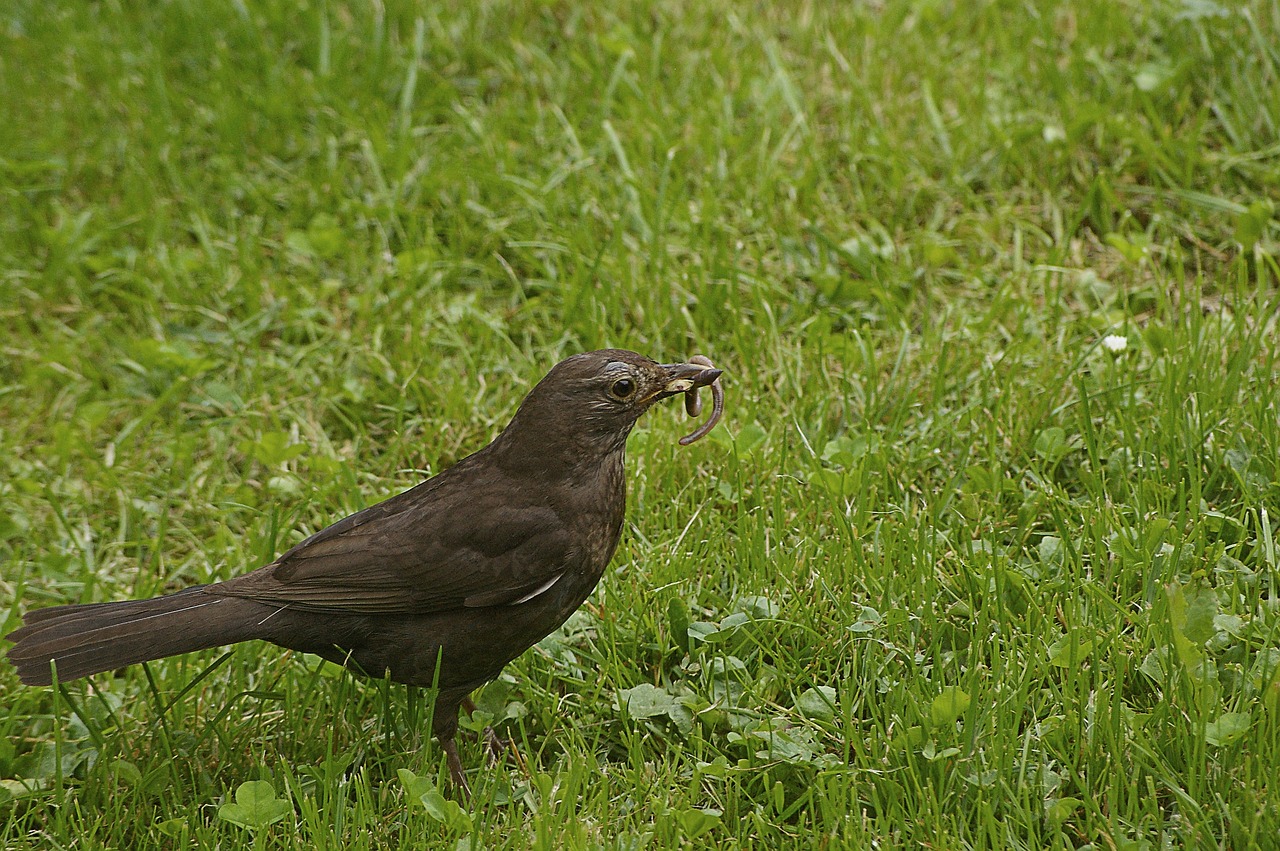
Supporting Beneficial Insects
This article explores the vital role of earthworms in sustainable gardening practices, highlighting their benefits for soil health, plant growth, and overall ecosystem balance.
Earthworms contribute significantly to soil structure and fertility, enhancing nutrient availability and promoting microbial activity essential for healthy plant growth.
These creatures play a crucial role in breaking down organic matter, facilitating the recycling of nutrients in the soil, which supports plant health and productivity.
Earthworms aid in the decomposition of organic matter, transforming it into nutrient-rich castings that improve soil quality and promote healthy plant growth.
By breaking down organic material, earthworms help regulate soil pH levels, creating a more favorable environment for plants to thrive.
The presence of earthworms boosts microbial communities in the soil, which are essential for nutrient breakdown and availability to plants.
Earthworms create burrows that enhance soil aeration and drainage, allowing roots to access oxygen and water more effectively.
The interaction between earthworms and plants is symbiotic, as earthworms improve soil conditions that directly benefit plant health and growth.
The burrowing action of earthworms loosens the soil, enabling roots to penetrate more deeply and access nutrients and water more efficiently.
Healthy soil enriched by earthworm activity helps plants resist diseases and pests, leading to stronger, more resilient gardens.
Earthworms contribute to a diverse ecosystem, supporting various organisms that coexist in healthy gardens, promoting balance and resilience against environmental changes.
Earthworms are not just vital for soil health; they also play a significant role in supporting beneficial insects within the garden ecosystem. When earthworms break down organic matter, they create a nutrient-rich environment that attracts a variety of insects. These insects, such as ladybugs, lacewings, and bees, thrive in gardens where earthworms are abundant. The presence of these beneficial insects is crucial for natural pest control and pollination, making your garden not only more productive but also more resilient.
Moreover, earthworm castings serve as an excellent food source for many of these insects, creating a thriving habitat where they can flourish. For instance, ladybugs feast on aphids, while bees are essential for pollinating flowering plants. By supporting earthworm populations, you indirectly enhance the presence of these helpful insects, leading to a balanced ecosystem.
In essence, earthworms act as the unsung heroes of the garden, fostering a habitat that nurtures beneficial insects. This symbiotic relationship is key to maintaining a healthy garden, where plants can grow strong and resist pests naturally. It’s like a well-orchestrated symphony, where each player has a role that contributes to the overall harmony of the garden.
- Why are earthworms called nature's tillers?
Earthworms aerate the soil as they burrow, which helps break up compacted soil and improves water infiltration, making them essential for soil health.
- How do I attract earthworms to my garden?
To attract earthworms, you can add organic matter such as compost, mulch, and decaying leaves to your garden, providing them with food and habitat.
- Can earthworms harm my garden?
No, earthworms are generally beneficial to gardens. They improve soil structure, enhance nutrient availability, and support plant health.
- How do earthworms help with pest control?
By supporting beneficial insects that prey on pests, earthworms indirectly contribute to natural pest control in the garden.

Creating Habitat for Other Species
Earthworms are not just the unsung heroes of soil health; they also play a crucial role in creating a habitat for a myriad of other species. Think of earthworms as the ultimate gardeners, not only nurturing the soil but also fostering an environment where countless organisms can thrive. When earthworms burrow through the ground, they create a network of tunnels that serve as highways for various small creatures, including insects, fungi, and even plant roots. This underground ecosystem is vital for maintaining balance in the garden.
One of the most fascinating aspects of earthworm activity is how it enhances the overall biodiversity of a garden. The castings produced by earthworms are rich in nutrients, which attract beneficial organisms such as beetles, spiders, and predatory insects. These species contribute to natural pest control, reducing the need for chemical interventions. In essence, earthworms help establish a self-sustaining ecosystem where every creature has a role to play, promoting a healthier garden environment.
Moreover, the presence of earthworms can lead to increased plant diversity. Different plant species often rely on varying soil conditions, and earthworms help create a more hospitable environment for these plants. For example, some plants thrive in slightly acidic soils, while others prefer neutral or alkaline conditions. Earthworms assist in balancing soil pH, making it easier for a range of plants to flourish. This diversity not only looks beautiful but also enhances the garden's resilience against pests and diseases.
Another key benefit of earthworms is their ability to support the growth of beneficial fungi. Mycorrhizal fungi, which form symbiotic relationships with plant roots, rely on the organic matter broken down by earthworms. As earthworms digest organic materials, they release essential nutrients that these fungi can utilize. In return, the fungi help plants absorb water and nutrients more effectively. This symbiotic relationship creates a thriving habitat for both fungi and plants, further enriching the garden ecosystem.
In summary, earthworms are essential for creating habitats for other species, contributing to a rich tapestry of life within the garden. Their burrowing actions, nutrient-rich castings, and ability to improve soil conditions foster an environment where various organisms can coexist and thrive. By nurturing these vital creatures, gardeners can promote biodiversity, enhance pest control, and create a more resilient ecosystem overall.
- What do earthworms eat? Earthworms primarily consume organic matter, such as decaying leaves and plant material. They break this down into nutrient-rich castings that improve soil health.
- How do earthworms benefit plant growth? Earthworms improve soil aeration, drainage, and nutrient availability, which are all crucial for healthy plant growth.
- Can I introduce earthworms to my garden? Yes, introducing earthworms can be beneficial. You can purchase composting worms or create a suitable environment for native species to thrive.
- Do earthworms help with pest control? Yes, by promoting a diverse ecosystem, earthworms can support beneficial insects that naturally control pests.
Frequently Asked Questions
- Why are earthworms essential for soil health?
Earthworms are like nature's little gardeners! They improve soil structure by creating burrows, which enhances aeration and drainage. This means roots can access oxygen and water more easily. Plus, their castings are nutrient-rich, providing essential nutrients that plants need to thrive.
- How do earthworms contribute to nutrient cycling?
These amazing creatures break down organic matter, turning it into valuable nutrients for plants. By decomposing leaves, grass, and other organic materials, they facilitate nutrient recycling in the soil, ensuring that plants have access to what they need for healthy growth.
- What is the decomposition process involving earthworms?
Earthworms are nature's recyclers! They consume organic waste and, through their digestive process, convert it into nutrient-rich castings. This process not only enriches the soil but also accelerates the decomposition of organic materials, making nutrients more available to plants.
- Can earthworms affect soil pH?
Absolutely! By breaking down organic materials, earthworms help regulate soil pH levels, creating a more favorable environment for plants. A balanced pH is crucial for nutrient availability, so earthworms play a vital role in maintaining that balance.
- How do earthworms enhance microbial activity in the soil?
Earthworms boost microbial communities by creating a hospitable environment in their burrows. These microbes are essential for breaking down organic matter and making nutrients available to plants, significantly improving soil health.
- What impact do earthworms have on plant growth?
The relationship between earthworms and plants is symbiotic. Earthworms improve soil conditions, allowing plants to grow stronger and healthier. They help in root development, making it easier for roots to access water and nutrients.
- Do earthworms help plants resist diseases?
Yes, indeed! Healthy soils enriched by earthworm activity contribute to plant resilience against diseases and pests. This means that gardens with a healthy earthworm population tend to be more robust and less prone to problems.
- How do earthworms promote biodiversity in gardens?
Earthworms foster a diverse ecosystem by supporting various organisms that coexist in healthy gardens. Their presence encourages beneficial insects and creates habitats for other species, enhancing overall ecological stability.
- What role do earthworms play in supporting beneficial insects?
Earthworms create a balanced ecosystem that attracts beneficial insects. These insects are crucial for pest control and pollination, making your garden not only healthier but also more productive!
- Can earthworms create habitats for other organisms?
Definitely! By enhancing soil structure and fertility, earthworms help create a thriving habitat for various organisms. This biodiversity is essential for maintaining ecological balance and resilience in the garden.

